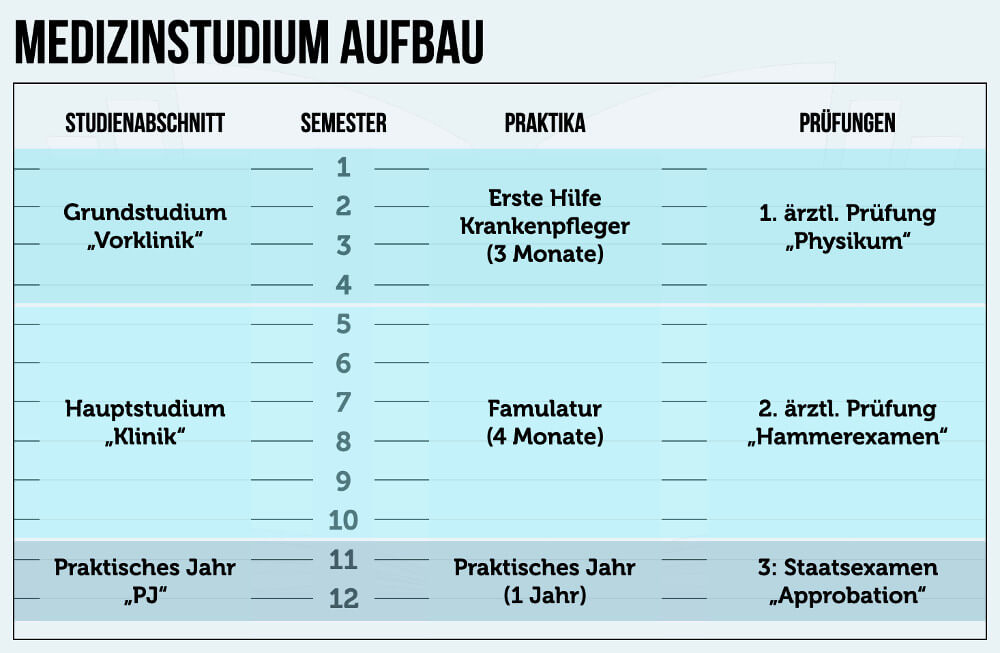Is it hard to study medicine in Germany?
Let me answer this question with a famous joke in Germany (there are many variations, but they all lead to the same thing). ‘When a physics professor asks his students to memorize a phonebook, they ask why they should do it. When you ask medical students, you get a response with the question “until when?”‘.
As you can appreciate, since my son was determined to study Medicine, I was doing more research on Medical Education in Germany. There are 40 medical faculties in Germany, 4 of which are private. Last time I checked, 36 of their affiliated universities are among the top 1000 in the world rankings.
Medical programs in Germany last six years and are conducted entirely in German, so you need a strong knowledge of the language. But apart from human medicine, there are alternative programs in medicine (including some English programs) as bachelor’s and master’s degrees.
Structure of medical education in Germany
It takes at least six years and three months to complete training in human medicine, culminating in a state examination (Ärztliche Prüfung). If you pass this exam, you are certified as a doctor. On the way, you have to go through the following stages:

Medicine in Germany Phase 1: “Preclinical phase”
This stage lasts four semesters (two years) and includes two years studying natural sciences such as biology, chemistry and the basics of medicine. You will then be expected to pass a licensing exam (1st state exam) to prove that you can work in clinics. What I am describing here is the German classical medical curriculum (Regelstuiengang). However, since the two years in this model are disappointing for students who want to study medicine and the state exam is very demanding, different curricula are being tried. “Modellstudiengang” (Modellstudiengang), which has been introduced in a small number of universities, blends the pre-clinical and clinical phases of medical education and introduces more practical applications into the curriculum from the first year. (See for a list of these universities)
Medicine in Germany Phase 2: “Clinical phase”
This stage (six semesters – three years) is the stage where the core subjects taught in the first two years are applied in the clinic and the basic knowledge is deepened through lectures, clinical practice, internships and seminars. At the end of this stage you have to pass a national examination (2nd state examination).
Medicine in Germany Stage 3: “Year of Practice”
The clinical phase is followed by a practice year. This is a year of clinical training that introduces you to the practical aspects of surgery, internal medicine and a subject of your choice. This phase is focused on providing work experience for after graduation.
Medicine in Germany Stage 4: “State Examination”
To complete your medical studies in Germany, you need to pass the 3rd State Examination, which is a standardized exam across Germany. Once you have taken and passed the exam, you can apply for your medical license (Approbation) and start working as a certified doctor.
You can then continue your specialty training, which can take another five to six years, depending on the area you want to specialize in. You can do your residency in hospitals, clinics or even in a specialist doctor’s office.
Requirements to study medicine in Germany
First of all, as I mentioned above, you need to know enough German to get a high score in a German exam such as TestDaF, DSH or Goethe C1. If your German is not yet at a sufficient level, it is also possible to enroll in the preparatory language schools of universities.
Requirements to study medicine in Germany
In addition to the HZB you need, as I mentioned above, you need to know enough German to get a high score in a German test such as TestDaF, DSH or Goethe C1. If your German is not yet at a sufficient level, it is also possible to enroll in the preparatory language schools of universities.
The HZB is a detailed subject as it varies between countries. You can access my previous article on HZB here.
Besides these ;
If you want to study medicine in Germany, you will definitely need to have a good knowledge of Biology, Chemistry and Physics at high school level.
You should also have the ability to cope with stress and up to 25-30 hours of compulsory classes per week, as medical programs are often time-consuming and intensive.
What is my NC score to study medicine in Germany?
Since there is a high demand for departments such as Medicine, Dentistry, Pharmacy in Germany, your NC score will be used in ranking (If you ask what is NC score, see: What is VPD and NC?) You will need to calculate your NC score before you start dreaming. I would like to remind you that there is a 5% foreign student quota in Germany for the departments mentioned above. Keep in mind that there is room for roughly 450 foreign students for medicine and around 80 for dentistry (this is the total quota from all over the world).
In order not to be a dreamer, if you want to study medicine, your NC should be at least 1.1, at worst 1.2. For dentistry, 1.1 is a must. As an exception: some universities attach great importance to the TestAs exam, so a high score on this exam can reduce your chances of admission to 1.5 NC points. If you are curious about the TestAs exam, read my article. (See TestAS exam) Apart from that, don’t believe too much no matter what anyone tells you. Many consulting companies will try to sell you a dream in order to get a consulting fee from you.
I hope this has been useful. For your questions, you can reach me at recep[at]recepdayi.com.tr e-mail address, my social media accounts and the comment section below.
Knowledge grows as you share it. Please share




